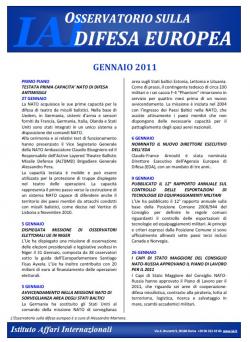Observatory on European defence, March 2006

6-7 March 2006
Informal Meeting of the EU Defence Ministers - Capabilities, European Defence Agency, R&T
The EU Defence Ministers, the High Representative for CSFP Solana and the Secretary General of NATO de Hoop Scheffer met in Innsbruck (Austria) on 6 and 7 March to discuss the issues concerning civil/military interaction, stabilization operations, development of European cooperation in particular in the sector of research and development in defence.
Civil/military interaction was the focus of the proposals submitted by Solana who, with the aim of strengthening the EU's disaster response capability, urged the use of ESDP assets to support EU civil protection and humanitarian aid interventions. For this purpose, the most urgent needs are to develop greater capabilities in the strategic transport domain, to identify and develop means of support for disaster response and strengthen Europe's reaction capability.
Alongside the informal meeting, the Steering Board of the European Defence Agency (EDA) outlined the launch of Research & Technology (R&T) activities. Ministers examined three possible actions: increasing ad hoc projects among groups of member States, increasing the budget of the Agency spent on behalf of the member States, and establishing an EDA special programme for joint investments in R&T which could be funded by a group of contributors.
The details concerning the joint investment mechanism will be submitted in May to the Steering Board, which will also set out an overall European strategy for defence research.
20 March 2006
EU General Affairs and External Relations Council - Iraq, Congo, Sudan/Darfur
The General Affairs and External Relations Council (GAERC), reviewed the EU commitment in several crisis areas:
- Iraq: the Council conferred a mandate upon the European Commission to negotiate a trade and cooperation agreement with Baghdad. The agreement will also include clauses related to respect of human rights, a commitment not to develop weapons of mass destruction (WMD) and the fight against terrorism.
- Democratic Republic of Congo (DRC): ministers approved an EU military mission to guarantee the security of the Congolese elections to be held on 19 June. The lack of any objections by 23 March allowed for approval of the operation by the Council. The mission foresees the deployment of 400-450 soldiers with a reserve of about 1,000 men based in Africa outside DRC territory, but ready for rapid intervention. The EU forces will support, on request of the United Nations, the UN MONUC mission for a period of 4 months; planning and command are entrusted to the German Headquarters in Potsdam.
- Sudan/Darfur: the Council agreed with the decision adopted by the African Union (AU) on 10 March to extend the AMIS II mission in Darfur (Sudan) until 30 September 2006 (the previous deadline was 31 March), with the prospect of transferring the mandate to the UN; on 29 March, UN Secretary General Annan was formally tasked with this by the UN Security Council.
Previous diplomatic talks also involving the United States affirmed the idea of possible European and US support to the UN mission with the AU maintaining a fundamental role. NATO in particular is studying options that exclude a commitment involving men on the ground, indeed focusing on logistic support.
March 2006
EU - Bio-terrorism
EU action for countering international terrorism continues.
The Commission is studying a Communication on the EU's preparedness in relation to the bio-terrorist threat and a Green Paper on detection of biological risks which should be launched in July.
The EU budget for the preparatory activities for bio-terrorism shows an increasing trend: 500,000 euros for 2006, 1.5 million in 2007, and 4.5 million in 2009.
On 28 March EuropaBio, the European association of bio-industries, launched, in the presence of the European Commission (EC), a European task force to increase the awareness of the institutions towards this issue and to develop cooperation.
March 2006
Europe - Non-proliferation, Iran
Since the proposal, which was also supported by the EU-3 (France, Germany, United Kingdom, plus High Representative for CFSP Solana) to partially transfer Iranian enrichment activities to Russian territory failed, on 8 March the issue was formally reported to the UN Security Council (UNSC) by the International Atomic Energy Agency (IAEA).
While the 5 permanent members of the UNSC agreed at the IAEA on reporting the case to the UN, they failed to agree on the sanctions possibly to be adopted.
A not binding UNSC presidential statement of 29 March calls for Iran to suspend enrichment activities and satisfy IAEA requirements within 30 days: a report by the IAEA General Director El Baradei will check compliance with the requirements.
On the occasion of the EU General Affairs and External Relations Council of 20 March, ministers confirmed their willingness to reach a diplomatic solution of the issue by exerting pressure on Teheran and demanding commitments on issues such as the fight against terrorism, support for the peace process in the Middle East, and respect of human rights.
-
Details
Roma, Istituto affari internazionali, 2006 -
Issue
06/03


